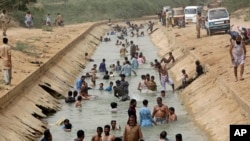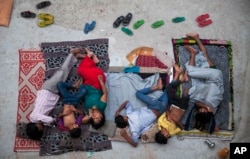New data from 52 countries in hot climates reveals that over 1.1 billion people face "significant risks" — including death — from lack of access to cooling, a U.N. envoy said Monday.
Rachel Kyte told a press conference that "millions of people die every year from lack of cooling access, whether from food losses, damaged vaccines, or severe heat impact."
The U.N. envoy, who is promoting the United Nations goal of providing sustainable energy for all people by 2030, said nine countries in Asia, Africa and Latin America with the biggest populations that face major risks are Bangladesh, Brazil, China, India, Indonesia, Mozambique, Nigeria, Pakistan and Sudan.
Kyte stressed that "cooling for all" doesn't mean "putting an air conditioner in every home."
She said an urgent effort is needed to clarify cooling needs, engage governments and the private sector, and develop and test possible new solutions.
Kyte spoke on the sidelines of this week's high-level event assessing progress on six of the 17 U.N. goals adopted by world leaders in 2015 to combat poverty, promote development and preserve the environment by 2030. One of the goals is universal access to sustainable energy.
U.N. Deputy Secretary-General Amina Mohammed told the opening session that there has been progress on reducing maternal and child mortality, tackling childhood marriage, expanding access to electricity, addressing global unemployment, and cutting the rate of forest loss around the globe.
But Mohammed said in other areas "we are either moving too slowly, or losing momentum."
"For the first time in a decade, the number of people who are undernourished has increased — from 777 million people in 2015 to 815 million in 2016 — fundamentally undermining our commitment to leaving no one behind," she said.
Young people remain three times more likely to be unemployed than adults, most of the world's extreme poor are projected to live in urban settings by 2035, and basic sanitation remains "off track," she said. And "we are seeing alarming decline in biodiversity, rising sea levels, coastal erosion, extreme weather conditions and increasing concentrations of greenhouse gases" that cause global warming.
As for access to energy including renewable energy, Mohammed said the rate of progress "is not fast enough to meet our target."
"We need to also double our efforts on energy efficiency," she said. "250 million more people in Africa have no access to clean fuels for cooking compared to 2015."
Kyte, who is also CEO of the nonprofit organization Sustainable Energy for All, stressed that without ensuring access to cooling for all people, the U.N. goal of universal access to energy will not be achieved.
She stressed that "access to cooling is not a luxury" but "a fundamental issue of equity. And as temperatures hit record levels, this could mean the difference between life and death for some."
While 1.1 billion people lack access to cooling, Kyte said another 2.3 billion people present "a different kind of cooling risk."
They represent "a growing lower-middle class who can only afford to buy cheaper, less efficient air conditioners, which could spike global energy demand and have profound climate impacts," she said.
As examples of other hurdles that must be overcome in the next 12 years, she said, 470 million people in poor rural areas don't have access to safe food and medicines and 630 million people in hotter, poor urban slums "have little or no cooling to protect them against extreme heatwaves."
In India, Kyte said, "nearly 20 percent of temperature-sensitive health care products arrive damaged or degraded because of broken or insufficient cold chains, including a quarter of vaccines."








